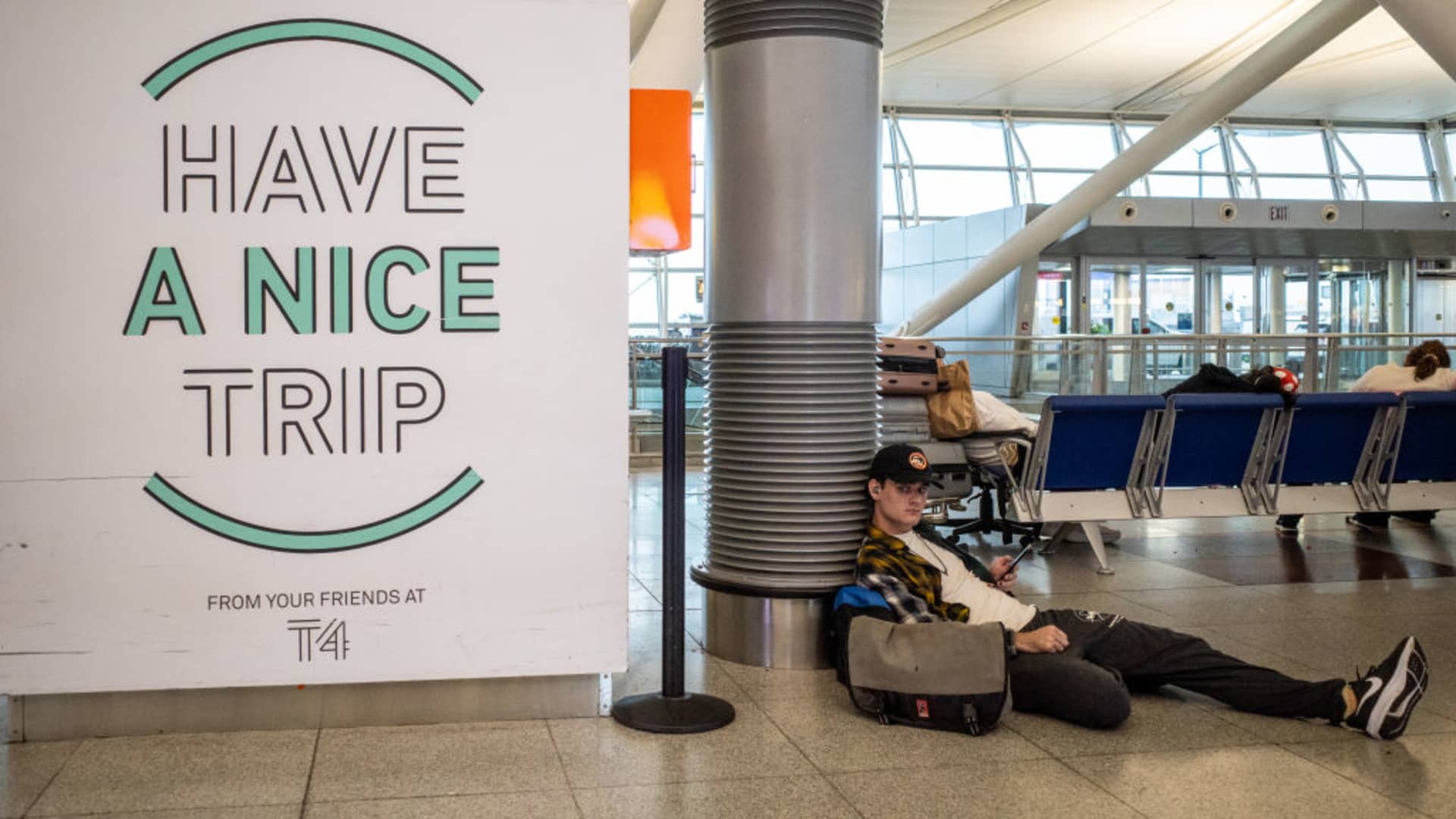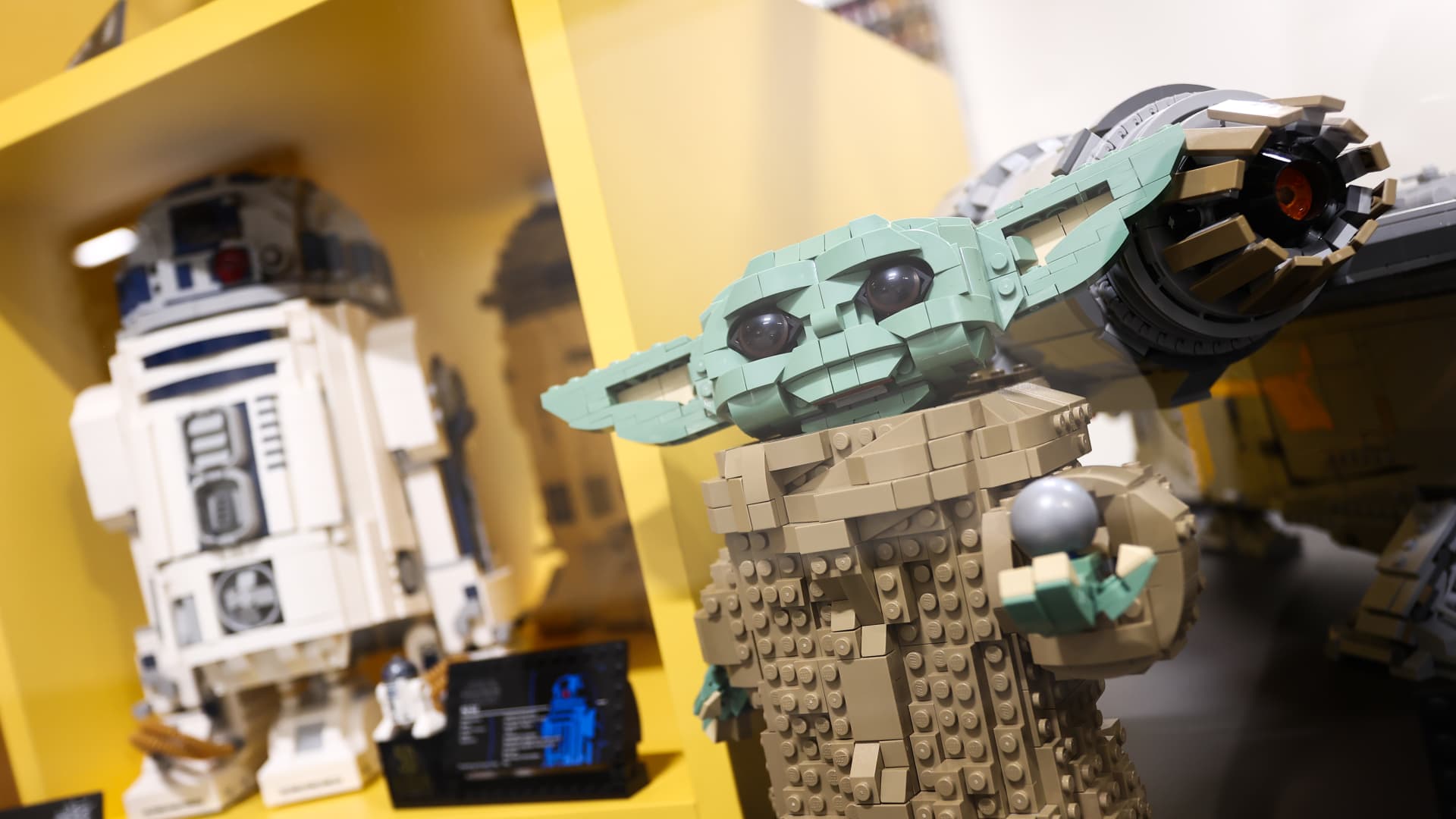
A person sits on the ground at JFK International airport on June 30, 2023 in New York City.
David Dee Delgado | Getty Images
Flight delays and cancellations continued to mar thousands of Fourth of July travelers on Friday, with United Airlines passengers bearing the brunt of the problems.
A slew of thunderstorms along the East Coast at some of the country’s most congested airports kicked off the chaos last weekend. Some airline executives blamed the Federal Aviation Administration’s shortfall of air traffic controllers for exacerbating the problems for their customers.
The Transportation Security Administration expects to screen 17.7 million people from June 29 through July 5, peaking on Friday at more than 2.8 million people. That would be an all-time single-day record for screenings and one of the clearest signs yet of air travel’s strong recovery from the pandemic.
Airlines are under political and public pressure to run reliably after their overambitious schedules and staffing shortages worsened routine challenges like bad weather. The struggles come as travel demand bounces back from pandemic lows.
More storms and challenges like wildfire smoke from Canada are likely to plague airlines in the days ahead, though the worst of the disruptions this week have mostly subsided. (Of course, if your flight is canceled or delayed, here’s what airlines owe you.)
Travelers arrive at O’Hare International Airport on June 30 2023 in Chicago, Illinois. Travel forecasters are predicting record travel for the July 4th weekend, but this year’s celebration may also be something of a battle with the elements.
Kamil Krzaczynski | AFP | Getty Images
More than 42,000 flights operated by U.S. airlines were delayed from Saturday through Thursday, and more than 7,900 were scrubbed altogether, according to flight-tracker site FlightAware. More than 5% of U.S. schedules were canceled, about four times higher than the cancellation rate so far this year.
Travelers sprawled out on airport floors, waiting for hours for flight information or new schedules. They also faced long lines for customer service and lost bags.
United Airlines has fared the worst with disruptions, with half of its mainline flights arriving late during that six-day period amounting to average delays of 106 minutes, according to FlightAware data. Another 19% of its schedule was canceled.
On Friday, United canceled more than 200 flights, 7% of its mainline schedule. Another 316 flights, or 11%, were delayed. New York-based JetBlue Airways had nine cancellations and 171 delays, or 16% of its schedule.
Transportation Secretary Pete Buttigieg called United out for the flight disruptions, saying the airline’s disruptions were “elevated but moving in the right direction.”
United said late Thursday that it expected cancellations and delays to continue to improve into the holiday weekend. The airline has been offering waivers to travelers affected so they can rebook their trips without paying fare differences.
“We’re grateful to our customers who have endured a lot of disruptions over the last few days and to our teams who have worked around the clock to care for them,” United said in a statement.
But labor unions blasted the company for failing to get a handle on its operation, which left crews out of place and facing long wait times to speak with schedulers or book hotels.
“United management’s failure to properly staff crew schedulers, the flight attendant support team and more has exacerbated these operational issues and left passengers and Flight Attendants waiting for answers for hours at a time,” Ken Diaz, president of the United chapter of the Association of Flight Attendants, said in a statement on Thursday. “The airline actually ‘lost’ crews in the system for days on end because there was such a significant breakdown in running the operation.”
Garth Thompson, a United captain and chairman of their Air Line Pilots Association union, accused the company of not investing in the operation.
“Summer flying can be challenging, but this summer will be unnecessarily memorable,” he said. “To those caught up in management’s unforced errors, I’m truly sorry.”
Both unions are engaged in contract negotiations with the company and are seeking compensation and scheduling improvements.
United CEO Scott Kirby on Monday wrote to staff that some of the issues last weekend stemmed from air traffic controller understaffing, and said that “the FAA frankly failed us” when it slashed arrival and departure rates at Newark Liberty International Airport in New Jersey, a major United hub.
The FAA had warned about staffing shortages in the New York City area earlier this year, and some airlines agreed to reduce capacity to avoid overloading the system.
“It led to massive delays, cancellations, diversions, as well as crews and aircraft out of position,” Kirby wrote in a staff note, which was seen by CNBC. “And that put everyone behind the eight ball when weather actually did hit on Sunday and was further compounded by FAA staffing shortages Sunday evening.”
JetBlue also blamed the FAA for similar issues.
“We are working with the FAA to better understand what led to the significant and unexpected ATC restrictions this week that affected thousands of flights across carriers,” JetBlue’s COO Joanna Geraghty said in a memo to employees on Wednesday. “The severity and lengthy duration of the latest programs were worse than we have seen in the past with similar weather and this has left tens of thousands of our Customers inconvenienced and, in many cases, blaming JetBlue for a situation outside of our control.”







